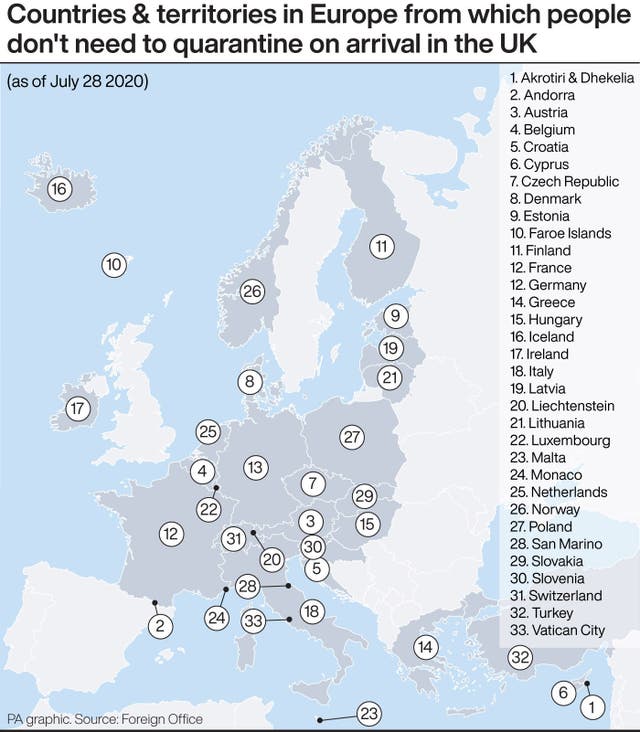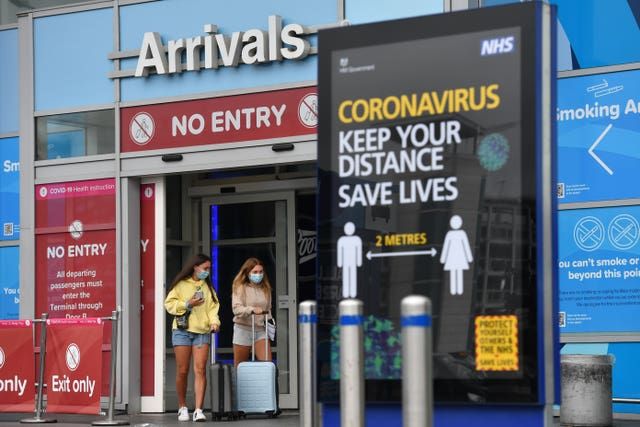Boris Johnson’s government faces a diplomatic storm with Spain and warnings that its policy on travel to the country risks major damage to business and confusion for holidaymakers.
The Foreign and Commonwealth Office (FCO) has warned against all but essential travel to Spain’s Balearic and Canary Islands, having already issued the same advice for the mainland.
Travellers from all parts of Spain are required to quarantine for a fortnight on arrival in the UK, a change imposed at short notice over the weekend.
Travel advice for #Spain has been further updated. The FCO now advises against all non-essential travel to Spain, including the Balearic and Canary Islands. You will have to self-isolate for 14 days on arrival into the UK. Find out more: https://t.co/Pk5gBRIn2w pic.twitter.com/7Jo6dRtIAM
— FCO travel advice (@FCOtravel) July 27, 2020
Spain’s prime minister Pedro Sanchez described the latest move as an “error”.
He pointed out that the upsurge in coronavirus cases is focused in two regions, Catalonia and Aragon, adding: “In most of Spain, the incidence is very much inferior to even the numbers registered in the United Kingdom.”
Madrid had been urging the UK to exclude the Canaries and Balearics – which include popular tourist resorts on Ibiza, Majorca and Menorca – from its quarantine requirements.
But instead, official travel advice was tightened to bring the islands in line with the Spanish mainland.
The UK government rejected the Spanish criticism of its response.
Local government minister Simon Clarke told BBC Breakfast: “We respectfully disagree with the Spanish government’s position on this.
“We obviously continue to work closely with them and we wish them every success in managing this outbreak, but we’ve seen a very sharp increase in cases in Spain.
“A 75% increase in cases reported between the middle of last week and the end of last week. That’s why we took the action that we have.
“Clearly, you do have to make decisions on a country-wide basis. There is going to be internal transfer within Spain and it’s important that we do our utmost to protect the public.”

The decision to impose quarantine restrictions was made after England’s chief medical officer Chris Whitty reportedly told ministers that 10 Britons who tested positive for coronavirus after 1 July had reported visiting Spain in the 14 days before their test.
Clarke would not be drawn on the specific report but told BBC’s Today it was an “entirely plausible scenario that people have returned to the UK carrying the virus” as a result of the outbreak in Spain.
Britons make up over a fifth of foreign visitors to Spain, which relies heavily on tourism, and Madrid has said the UK government gave it no warning that the quarantine move was coming last weekend.
Travel firm TUI UK cancelled all holidays to the Balearic Islands and Canary Islands after the FCO’s updated travel advice.
TUI’s decision runs from Tuesday 28 July up to and including Friday 31 July.
Holidays to Spain’s mainland were already cancelled from Sunday 26 July up to and including Sunday 9 August.
“All customers due to travel to Spanish destinations between Sunday 26 July and Sunday 9 August will be able to cancel or amend their holiday and will be able to receive a full refund or the option to rebook their holiday with a booking incentive,” TUI UK said.
The company added: “The UK government must work closely with the travel industry as this level of uncertainty and confusion is damaging for business and disappointing for those looking forward to a well-deserved break.”
CUSTOMER UPDATE – 27.07.20FOLLOWING PREVIOUS ANNOUNCEMENT REGARDING MAINLAND SPAIN, FURTHER UPDATE INCLUDING BALEARIC AND CANARY ISLANDS pic.twitter.com/pCACsdKQJG
— Jet2tweets (@jet2tweets) July 27, 2020
Jet2 also said that it was cancelling flights to a raft of destinations in Spain from Tuesday after the FCO announcement.
Rory Boland, Which? travel editor, said: “This is the third announcement we’ve heard from the government regarding travel to Spain in the last three days. Hundreds of thousands of UK holidaymakers in Spain or about to fly are utterly confused.”
Labour said the government must abandon its one-size-fits-all approach and introduce sectoral support for struggling businesses to ensure that public health measures such as the change in quarantine rules for people returning from Spain do not lead to mass job losses.
Labour’s shadow transport secretary Jim McMahon said: “The government’s handling of this issue has been nothing short of chaotic. The airline industry and passengers need clarity.

“The government must focus support on the sectors that desperately need it, like aviation, aerospace and its supply chain, which supports almost a quarter of a million jobs, with strict climate conditions and ensuring the gains are shared with the public.”
Meanwhile, the Daily Telegraph reported that quarantine for people arriving from Spain or other countries with high coronavirus levels could be cut to 10 days under plans being looked at by ministers.
Returned travellers would need to quarantine for eight days before being tested, and then only remain in quarantine for another two days should they test negative.
The paper reports the government is also considering instructing everyone who has returned from Spain since 23 July to get tested.
Speaking on BBC Radio Scotland’s Good Morning Scotland programme, Cabinet Office minister Michael Gove described the story as “speculation”.
He said: “We took the decision across the UK on Saturday that the situation in Spain was sufficiently concerning for us to require people, including people returning from the islands… to self-isolate for 14 days.
“The UK government discussed this approach with the Scottish government, the Welsh government and the Northern Ireland executive and we all agreed that the evidence was compelling and we all agreed to put public health first.”
He added: “The situation remains that 14 days quarantine if you’re returning from a country like Spain where there’s a high and rising instance of the virus is the best way to keep everyone safe.”
In better news for holidaymakers, five more countries were added to the quarantine exemption list on Tuesday – Estonia, Latvia, Slovenia, Slovakia and St Vincent and the Grenadines.

















